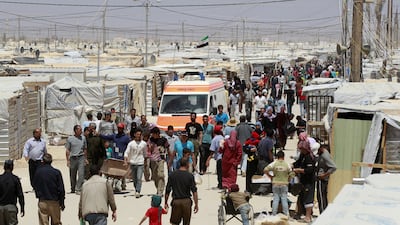A massive truck bomb was detonated outside the United Nations (UN) compound in Baghdad on August 19, 2003, which killed the head of the UN mission, Sergio Vieira de Mello, and 21 other people. This attack robbed the world of many brave humanitarian leaders. It also served as a reminder of how individuals risk their lives to serve humanity. To commemorate these brave and selfless people, we mark this day every year as World Humanitarian Day.
Fourteen years on, as another World Humanitarian Day draws near, our region is still at the top of minds when it comes to humanitarian emergencies. Arab League member countries serve as homes to nearly two-thirds of the 100 million people around the world needing humanitarian assistance. Many donors have come forward to generously help sufferers, but money alone isn't enough. It's true that humanitarian spending has increased from just 2 per cent of the total aid in 1980 to more than 10 per cent in 2015. However, there is a limit to how much funds can be raised.
Increasingly, donors are looking for innovative solutions that can bring about a change in their ability to support those in need. Often, the accelerating humanitarian crises means that people don’t always have the time test new approaches. Nevertheless, I see three such initiatives that might help improve the quality of the humanitarian response in the Middle East.
First, most refugee populations in Jordan and Lebanon are living outside organised camps, in overcrowded or informal accommodation. Many of them lack running water and sewage systems. That means waste is not properly disposed, which greatly increases the risk of disease, especially diarrhoea that can sometimes prove fatal for children. Proper water and sewage systems are unlikely to be built in the near future, especially for people who are expected to leave one day. Thankfully, there have been several innovations in the design of toilets and waste collection, spurred by donors working to improve the lives of poor slum dwellers, who live in a similar environment on the fringes of large cities. Efforts are under way to mass set up toilets that use less water and dispose of waste hygienically without a sewer system. Meanwhile, well-organised and hygienic waste collection and management services can provide business opportunities and jobs for those with little income. We need to make sure that these solutions are available to refugee and host communities in our region, so that refugees can live better lives.
_______________
More on the refugee crisis
More Syrian refugees leave Lebanon, but are they heading into the path of air strikes?
Syria’s refugees are losing hope of going home. They may be right
Architects and refugees team up to make small, affordable homes
_______________
The second one sounds simple – it’s cash. Donors have realised that often it’s the people living in emergency situations who know best exactly what they need. Giving them the purchasing power, rather than the material, allows them to meet their needs most efficiently, while also stimulating the local economy.
The problem is that handing out wads of currency notes in a war zone can cause security issues and even put the people at risk. So digital financial services are needed to transfer the money directly to the right people. This can then lead to those accessing other similar services, such as micro-loans. In this area too, humanitarian aid can benefit from efforts to bring mobile banking to the hundreds of millions of people living in poverty and do not have access to a traditional bank account, but do have access to a mobile phone. Systems and protocols have now been created that can reliably link payment systems and other financial services to hard-to-reach populations. Implementing and integrating these systems is now an important priority for donors and refugee hosting countries in the Middle East.
_______________
More from the author
How policymakers can support a new crop of young, qualified women
_______________
Finally, it’s about keeping cool. That’s not an easy thing for anyone in this region, especially during the scorching summer months. But for vaccines it’s even harder, as they need to be stored in a specific temperature. If they freeze, or heat up, they lose their efficacy. In very remote areas, such as the mountains of Yemen, that is especially difficult, because there is no electricity grid and fuel needed for generators is scarce. As a result, while millions of children in Yemen are being vaccinated, it is not known how many are actually protected against disease. This is another problem that many poor countries suffer from, and scientists have been trying hard to figure out a way address this problem.
Using technology originally developed for Nasa’s space programme, a new generation of super-insulated “cold chain equipment” (as vaccine storage is known) is able to keep vaccines at consistently low temperatures for up to 35 days with just one load of ice. A similar device, fitted with portable solar panels, can maintain those low temperatures indefinitely, regardless of the outside temperature.
These efforts indicate that our communities can leverage innovations designed for more long-term development projects to alleviate human suffering.
Fourteen years after the attack on the UN building in Baghdad, our region faces unprecedented levels of humanitarian crises. It's critical that we work to find new solutions to reduce that suffering.

